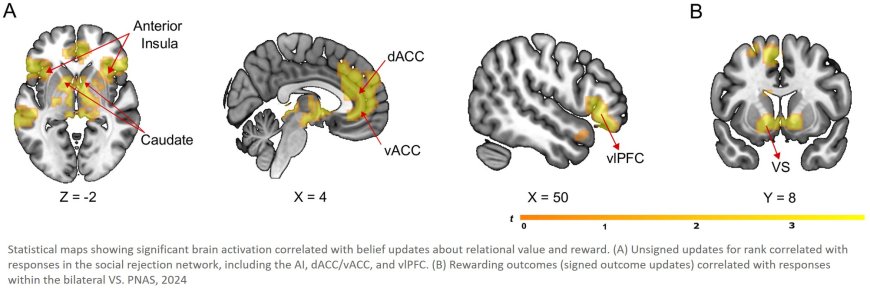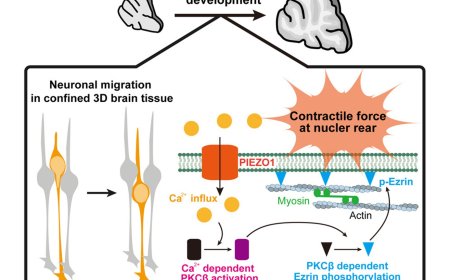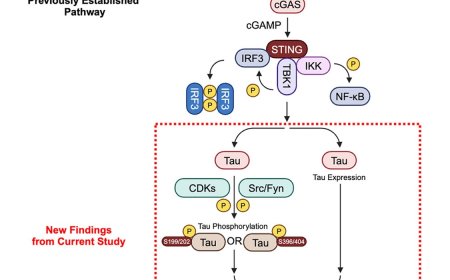What social rejection teaches your brain

The study, published in Proceedings of the National Academy of Sciences, uncovers the neurological mechanisms that influence how we form social connections. The findings help explain why we are drawn to interact with some people more than others, how we determine who values us, and why some interactions feel rewarding while others don’t — all questions with important implications for mental health and social behavior.
“While much research has examined the emotional impact of social rejection — how it causes distress, motivates people to reconnect and influences how people feel — we know far less about how it functions as a learning tool,” said the study’s corresponding author.
“How do these experiences help us fine-tune our understanding of our place in the social world, how others perceive us, and who we should invest in building relationships with?”
Using a combination of behavioral experiments, MRI neuroimaging and computational models, the study found that forming social ties relies on two brain functions: learning from positive outcomes, or rewards, and tracking how much others value us, known as relational value.
“For example, smiles or compliments are social rewards that can signal acceptance, which feels gratifying and encourages us to seek more interactions,” said the author. “Similarly, when we see that others value us — like when a colleague invites us to collaborate or a friend offers support — these cues motivate us to strengthen those bonds.”
Although these two types of learning often go hand in hand, they don’t always align, he said. For instance, someone may be left out of a friend’s wedding due to a tight budget or picked last for a team but still know their friend values them. Similarly, a top job candidate might not get hired, or a good friend might not always be available. These situations can be disappointing, but they don’t always reflect how much someone cares, the author said.
“Our study shows that specific parts of the brain activate during these experiences, tracking how much others value us even when they provide disappointing outcomes,” the author said. “Our hope is that understanding the neuroscience behind these learning processes can help us better understand certain mental health challenges. For some people, struggles may come from not recognizing how much others value them, like in social anxiety disorder. Others may have trouble feeling motivated by social rewards, as seen in depression, making it harder to connect with others.”
To investigate the neurological mechanisms underlying these learning processes, the researchers developed an experiment that college-aged participants would complete while undergoing neuroimaging in an MRI scanner. The students took part in an economic game designed to simulate social interactions to study trust and decision-making.
“College is a key time for social development, as students adjust to new environments and form new friendships,” the author said. “Later in life, social networks tend to stabilize, but in college, people experience major changes in their social circles.”
In the study, participants created profiles with personal details like examples of their honesty and how a friend might describe them. While the participants believed these profiles would be evaluated by others for trustworthiness, the responses participants received were computer-generated.
In each game round, participants, acting as “Responders,” chose between two computer-generated “Deciders” who they believed ranked them based on desirability as partners. If a match occurred, the Decider sent money to the participant, which tripled in value, and the participant decided whether to share half of the tripled amount or keep it all, testing trust and reciprocity.
“Social interactions generally present us with two learning challenges: First, we need to identify who might make a good partner to interact with; Second, we must determine whether others see us as a good partner,” the author said. “These insights are essential for navigating relationships, whether in friendships, collaborations or everyday interactions.”
Each round gave two types of feedback: whether the participant successfully matched with a Decider (a rewarding outcome) and how highly the Decider ranked them based on trustworthiness (relational value). Brain scans then showed how these responses are processed.
“If you’re selected but ranked eighth, it’s like being picked last for a team — you still get to play, but it’s clear you weren’t a top choice,” said the first author of the study.
“On the other hand, being rejected despite a high ranking is similar to being a strong job candidate who doesn’t get hired because there are only two openings,” the author explained.
The researchers used a computational model to understand how participants made decisions during the game. They found that participants were more likely to choose a Decider again if they had a positive outcome (successful match) and positive relational value (good ranking) in the previous round.
Neuroimaging showed that different brain regions became active depending on the type of feedback participants received, indicating that these two types of learning rely on distinct neural pathways. When participants adjusted their beliefs about how much others valued them, areas linked to social rejection were activated. In contrast, acceptance triggered the ventral striatum, a region associated with reward learning from money, praise or other positive experiences.
“Our study raises questions about how people learn differently from the same feedback to form connections,” the senior author said. “Does the way people process feedback — positive or negative — influence their openness to forming new connections?”
“Understanding these differences could unlock deeper insights into how we build and maintain relationships, shedding light on both healthy social behaviors and the challenges faced by those who struggle to connect.”












